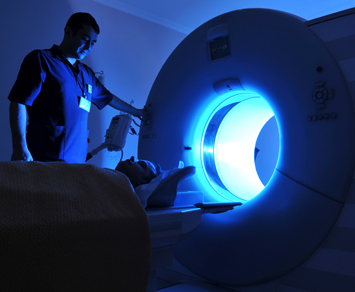Magnetic Resonance Imaging (MRI)
What is an MRI?
Magnetic Resonance Imaging (MRI) is a medical imaging exam that uses a strong magnetic field and radio waves to collect detailed information about the organs and tissues of the body. MRI does not use x-ray or radiation.
This information is displayed on a specialized computer system that is then studied and analyzed by a subspecialty board-certified radiologist, a doctor who has extensive training and expertise in medical imaging.
What should I bring to my appointment?
- Your insurance card
- A valid photo ID
- Implant device card, if applicable
- Previous imaging
Please arrive 15 minutes early to complete registration.
How should I prepare for my exam?
Please follow any instructions given by your healthcare provider.
MRI uses a strong magnetic field and radio waves to make detailed pictures.
Wear comfortable MRI safe clothes without metal fasteners, including zippers, buttons and snaps.
If there are body piercings that cannot be removed without a device please be sure to have a piercing salon remove them prior to your appointment.
Read over our MRI Metal Checklist here.
How long will my exam take?
Most MRI exams take 20-45 minutes.
What happens during my exam?
Depending on the MRI exam requested, you may be asked to change into a gown and robe. Jewelry, watches, hair clips, piercings and possibly dentures will need to be removed. You will have to leave all items containing metal, valuables and cards with magnetic strips (such as credit cards) in a locker outside of the MRI room.
A highly-skilled imaging technologist will operate the MRI scanner and tell you what to expect. An intravenous (IV) line may be placed in your arm so that contrast material can be injected. Images will be taken before and after the contrast material is injected.
You will be asked to lie on a cushioned, moveable table and may be positioned comfortably with bolsters. The technologist will provide you with headphones to listen to music. Earplugs are also available to muffle the noise. For the best quality images, you need to be as still as possible during the exam. You will hear a drumming sound as the machine captures the images. MRI exams often include multiple phases or sequences, some of which sound different and vary in length of time. You may be asked to hold your breath for approximately 20 seconds while the images are acquired.
What happens after my exam?
Your images will be interpreted by one of our board-certified radiologists. The findings will be sent to your healthcare provider, who will then contact you to discuss the results.
You may resume regular activities immediately after your exam.

 Copyright © 2025 · Minneapolis Radiology Associates ·
Copyright © 2025 · Minneapolis Radiology Associates ·